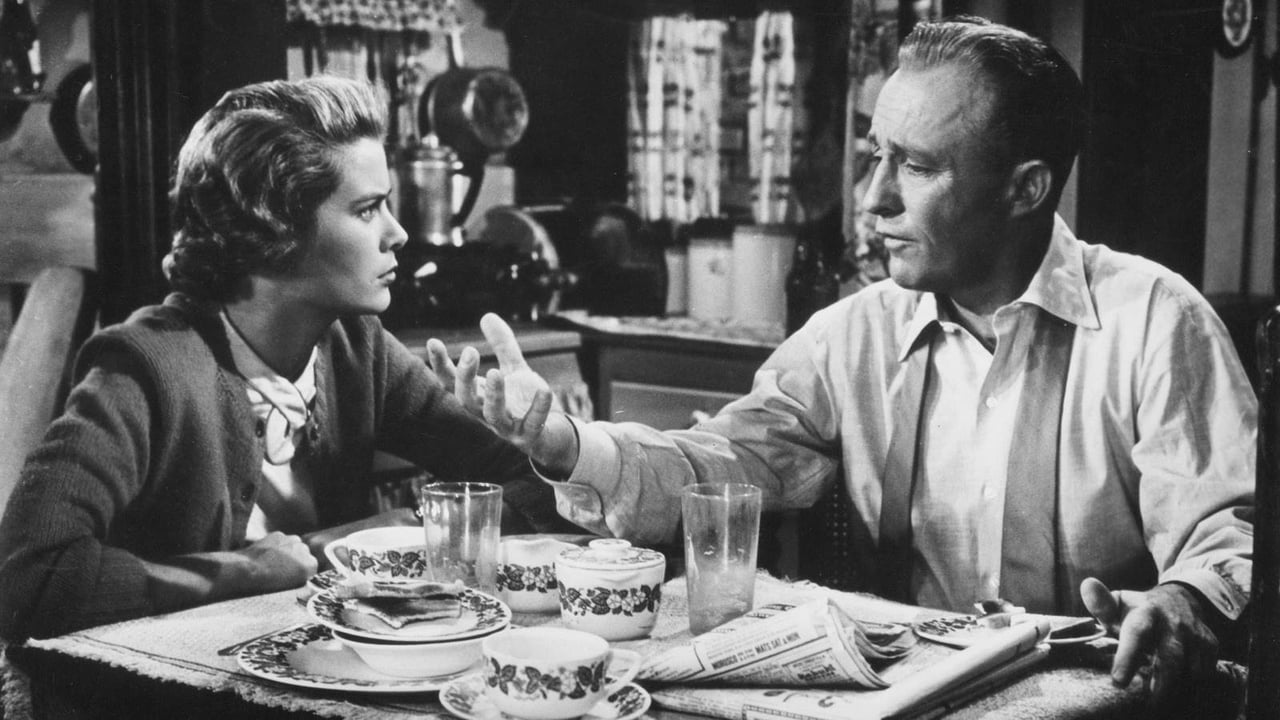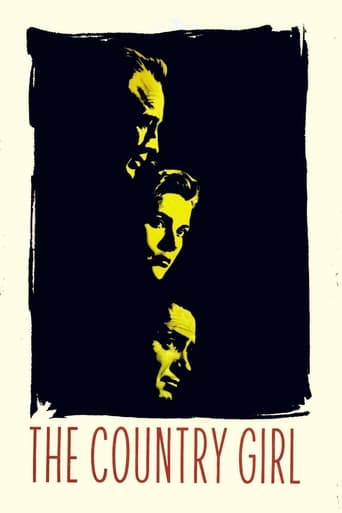Laikals
The greatest movie ever made..!
Phonearl
Good start, but then it gets ruined
filippaberry84
I think this is a new genre that they're all sort of working their way through it and haven't got all the kinks worked out yet but it's a genre that works for me.
Skyler
Great movie. Not sure what people expected but I found it highly entertaining.
talisencrw
I have mixed emotions in general about Bing Crosby, as both an entertainer and as a human being. Still, as I love both older movies and jazz singing (though most of his music couldn't be considered as such), I have sought out as many of his films as I can inexpensively find. This came out in a fine Grace Kelly boxed set that I found locally very inexpensively, and I greatly admired this performance of hers, at this early juncture of her very short filmic career. It was obvious, even now, that she would be a superstar. Hard to believe that director Seaton, who won an Oscar for the screenplay (Kelly won the other Academy Award, amongst the film's seven nominations), was the same director that later did 'Airport'. Kelly's rapport with both Crosby and William Holden is purely magical.
MartinHafer
This film is about a down-and-out performer (Bing Crosby) who has sunk into alcoholism and self-pity. However, out of the blue, he's received a huge break--to star in a Broadway show! Can the guy hold it together and rise to the occasion or will be return to the bottle and despair?! Although this idea is interesting, what is truly original is what happens with Crosby--how he copes with all this responsibility. Again and again, he manages to make it appear as if his wife (Grace Kelly) is a domineering woman who is trying to push him to fall on his face--when actually she is doing the opposite. She tries to help him from falling and, behind her back, he manipulates things so that the producer (William Holden) thinks SHE is the problem. Like many alcoholics, he has a great need to appear confident and capable AND to make excuses for when he does hit the bottle once again--'it's all her fault' is his excuse waiting to happen! Eventually, Crosby's manipulations result in Holden confronting Kelly for her supposedly undermining Crosby! He wants her to leave and return home so that Crosby will supposedly be free from distractions and her wicked clutches! Simply put, he's an alcoholic--a manipulative and insincere drunk. Now when I saw the film as a kid, I thought Kelly was a nice and innocent woman who meant well. Now, however, I see that by sticking with him, Kelly plays an enabler--a well-intentioned one but an enabler nevertheless. This, too, is interesting--creating a nice portrait of a drunk AND his partner.The film is original and cleverly written--plus it's one of the better films about addiction from this era. Grace Kelly received the Oscar for Best Actress for this performance. I used to think this was unmerited, though in seeing the film again I see what an exceptional job she did. Plus 1955 was a particularly weak year and she was better than the competition. Crosby was also nominated for an Oscar but considering Brando's performance in "On the Waterfront", it's not surprising he lost--though this is perhaps Crosby's greatest acting of his long career. Now this does not mean the film was perfect or problem-free. I cannot understand the casting as Kelly just seemed too young and glamorous (even when they gave her a very subdued makeup job)--I would have picked someone older considering Kelly was 51 and Kelly was 25! Although the part was to have been played by someone younger--perhaps in her mid-30s or older would have worked better. Otherwise, though, it's a very good film nevertheless. The other problem was the inexplicable relationship that sprang up between Holden and Kelly near the end....where the heck did THAT come from?!?! (yes, I know I ended this sentence with a preposition...deal with it. After 9600+ reviews I think I am entitled to one dangling preposition.)
Robert J. Maxwell
Well, it won Grace Kelly an Academy Award and it's easy to see why. She was delicious in a couple of earlier movies and positively supernal in "Rear Window." Here, too, she's playing against type -- not the glamorous, elegant blond but the beaten-down mousy wife in glasses, holding up her enfeebled alcoholic husband, Bing Crosby. But was she really actress enough for such a melodramatic role? Yes and no. She does okay, slumping her drab way through the role, radiating exhaustion. But when it comes to angry shouting she seems uncomfortable, as if in violation of the rules of the convent school in which she'd been educated.I don't know if that can be held against her. This is from a play by Clifford Odets and so all of the lines sound as if they were written for the stage. Nobody else sound especially natural either. Her worst moment is her most intense -- when the director, William Holden, who's trying to resurrect Crosby's career chews her out, blaming her for all of Crosby's weaknesses. She turns and slaps Holden hard across the face, then says with what intensity she can gather, "Did I forget to tell you I was proud?" That's pretty pompous stuff.With regard to that scene, it's a good illustration of the mediocre and middle-brow talent of the film's director, George Seaton. The pauses after the slap and after the devastating line are long. Very long. The camera lingers on the two figures in medium shot, waiting, one supposes, for the gasps to die down in the audience. You know, a good, efficient director of Grade B movies, which this is, at heart, would have given the audience credit enough to understand this is an important incident and would have edited his way quickly through it. Sam Fuller, nobody's idea of a self-important artist, would have introduced somehow a touch of irony.But director Seaton more or less stumbles through this stagy plot and exercises no discernible imagination in his staging. He's also responsible for the screenplay, which turns far too much time over to Bing Crosby singing vapid songs and cuts out what was one of the most important events in the play -- the scene in which the Holden character provokes the Crosby character into improvising a stunning angry speech in front of the producers. The power of that improvisation leaves the producers speechless and secures the job for Crosby.I remember that scene because many years ago I played Larry the Stage Manager in a college production of "The Country Girl." I was a far better Larry the Stage Manager than Gene Reynolds, who plays Larry the Stage Manager in the movie. I can prove I was better. I even got a fan letter. True, the letter was written by my girl friend, and, true, I had to threaten to pull her hair to get her to write it. But I'm morally certain when she thought about it later, she realized her accolade was justified. It's not a terrible movie, but it's not what it might have been. Holden is constantly on the edge of exploding. Crosby's performance belongs in a movie with Dorothy Lamour. And Kelly's exhaustion is exhausting. Most of the flaws I attribute to the director.
Liz Simmonds
This movie is utter torment for the modern viewer.Filming a play is difficult; to be true to the play and to the film medium is challenging. "Country Girl" is extremely two dimensional.The only lively scene is where Jacqueline Fontaine sings 'Love and Learn' with Bing.The acting is wooden. It would seem that Charlise Theron climbed onto the ugly-Oscar wagon, but Grace Kelly got there first. She is totally unconvincing as a housewife. Bing looks elderly and weary; the music is dull but he does his best with the material.The only acting strength comes from William Holden. His character learns and grows. The scene in which he kisses Grace, while somewhat unexpected, is powerful.Cliché is piled upon Cliché. At times tears are jerked; tears of fury and pain. The modern audience expects a little subtlety. And Bing's alcoholism seems to be a try-on by all parties; an excuse to behave very badly and add a few more clichés. The only cure for him in the context of the film would be shedding Grace - and maybe going after Jacqueline.Sure, there are good points. The audience disbelieves Grace and believes the charming Bing, but it is shown the truth in excellent filmic style, and swings just when Bill Holden does, into trusting Grace.And the almost-ending, where Bing releases Grace, is filmically sound. Bing is on one side of the room and the other two share a shot. That chunk of the script is good. Bing does 'noble' very well.Yet at the end Grace - lovely again - runs after Bing and good old Bill just watches from a window, giving a stylish long and elevated shot of Bing and Grace going home together. In real life she would have taken a break from both and ended up with Bill, or someone else.Was this an ending added after tryout? Grace states that she wants Bing to stand on his own feet and be a man again so that she can be free, yet she goes back to him. Tryouts? Codependance? Infuriating!Somehow the focus of this film was all wrong and the result was slow torture.Not recommended!!!

